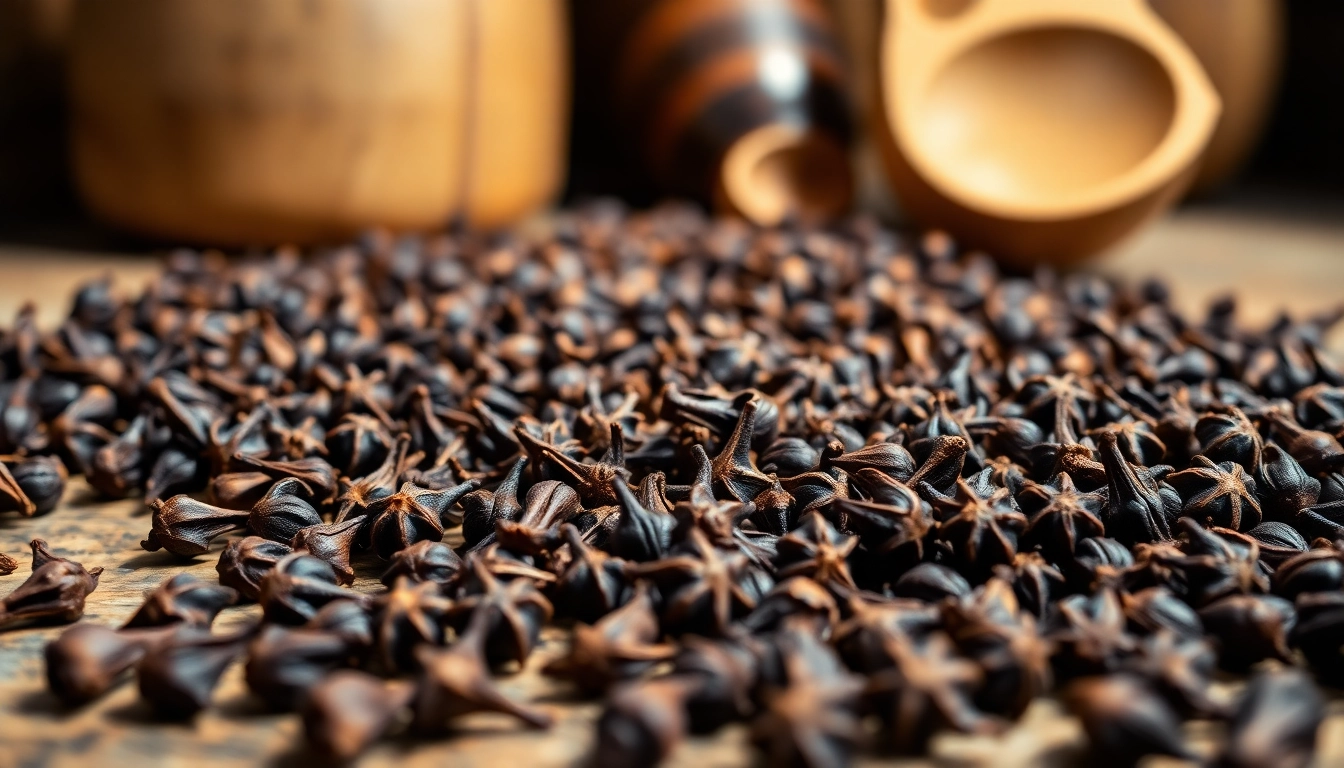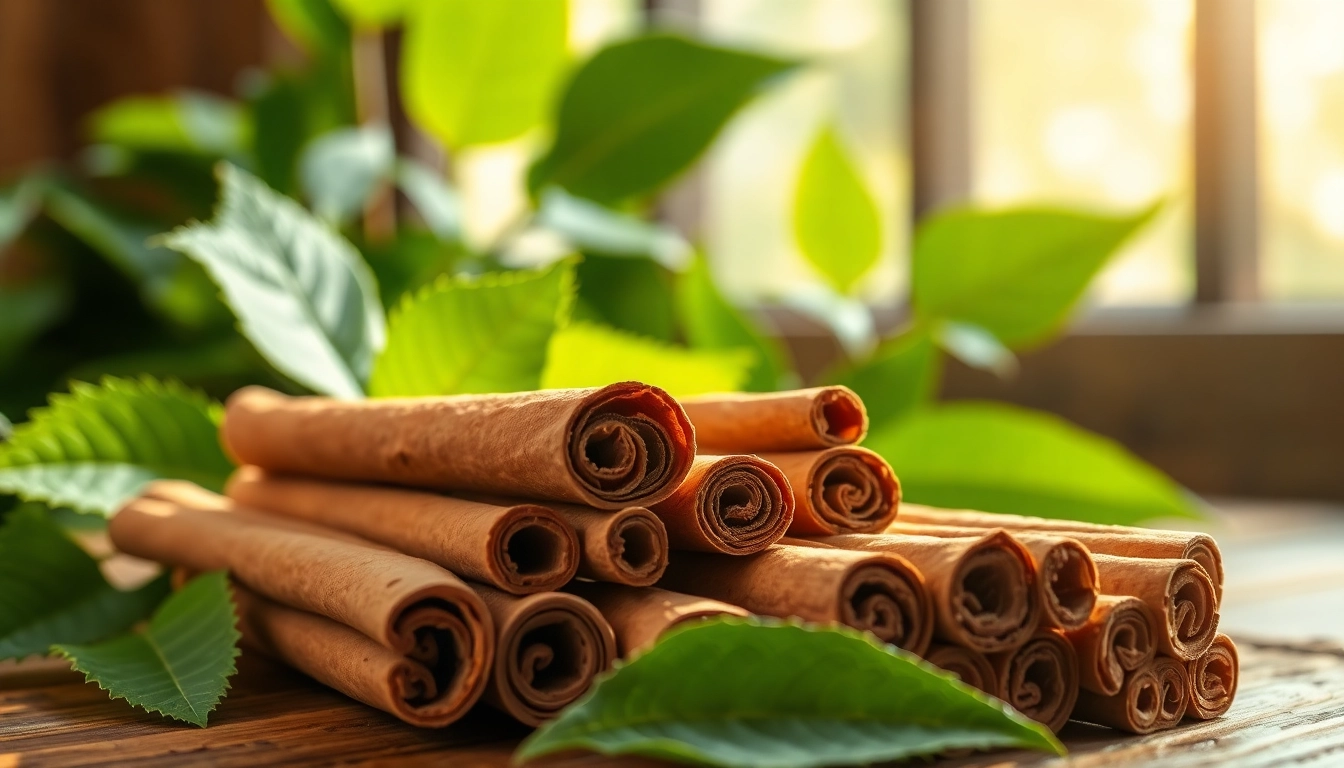Understanding Cloves: Nature’s Aromatic Buds
What Are Cloves? A Botanical Overview
Cloves are the aromatic flower buds of a tree in the family Myrtaceae, scientifically known as Syzygium aromaticum. These buds, which are harvested and dried before they open, originate from the Maluku Islands (Moluccas) in Indonesia. Cloves are known for their distinctive, strong flavor, making them a popular choice in both culinary and medicinal applications across the globe. Aside from their culinary uses, cloves are also included in various consumer products, from toothpaste to soaps and even cosmetics. If you’re intrigued by the value of cloves, their versatility is indeed remarkable.
The Unique Flavor Profile of Cloves
The flavor of cloves is intense and unmistakable. When used in cooking, they impart a warm, sweet, and slightly bitter taste with hints of spice. This unique profile comes from the presence of essential oils, primarily eugenol, which not only contributes to cloves’ flavor but also gives them their strong aromatic quality. When used sparingly, cloves can elevate dishes such as mashed potatoes, stews, and holiday baked goods with a distinctive warmth, rendering them indispensable in many kitchens around the world.
Cultural Significance of Cloves Worldwide
The cultural significance of cloves extends far beyond their use in cooking. Historically, cloves were so highly prized that they were used as currency in Southeast Asia. Their role in trade routes helped forge international connections, leading to various culinary adaptations influenced by the spice’s distinctive flavor. In many cultures, cloves are integral to festive dishes and celebrations, symbolizing warmth and comfort. For instance, in Indian cuisine, clove-infused dishes are frequently served during family gatherings and festivals, highlighting their rich cultural heritage.
Health Benefits of Cloves You’ll Love
Rich Nutritional Profile of Cloves
Cloves are not just aromatic; they are also packed with nutrients. A single teaspoon of whole cloves contains significant amounts of manganese, calcium, and magnesium, along with fiber and antioxidants. Manganese helps in bone formation and metabolism, while calcium and magnesium are vital for overall bone health. Incorporating cloves into your daily diet can contribute to fulfilling dietary mineral needs, promoting overall well-being.
Cloves and Their Antioxidant Properties
One of the standout characteristics of cloves is their high antioxidant content. Antioxidants play a crucial role in neutralizing free radicals in the body, thereby reducing oxidative stress, which can lead to chronic diseases. Studies have shown that the antioxidants found in cloves, such as eugenol, can help combat various health issues, including inflammation and cellular damage. By adding cloves to your dishes, you might not only enhance flavor but also support your body’s defense system against oxidative stress.
Potential Digestive and Anti-Inflammatory Benefits
Cloves have long been utilized in traditional medicine for their digestive benefits. They are known to alleviate digestive issues such as bloating, gas, and indigestion. Clove oil is often used to soothe an upset stomach due to its carminative properties, which help in expelling gas from the gastrointestinal tract. Furthermore, the anti-inflammatory properties of eugenol can potentially help reduce inflammation in the body, making it beneficial for people suffering from inflammatory conditions.
How to Use Cloves in Your Cooking
Incorporating Cloves into Savory Dishes
Cloves can be an unexpected yet delightful addition to various savory dishes. They are commonly used in Indian cuisine, complementing meats in curries and stews. When cooking with cloves, it’s essential to use them judiciously, as their strong flavor can overpower a dish. A few whole cloves can be added to braised meats, rice pilafs, or vegetable stews to impart a warm spice without overwhelming the palate. Remember to remove the whole cloves before serving, as they can be quite pungent if bitten into.
Sweet Treats and Beverages Enhanced by Cloves
Cloves shine in the world of baking, particularly during the festive season. They are often incorporated into recipes for gingerbread, pumpkin pie, and spiced cookies, creating a warm and inviting flavor profile. Clove-infused beverages, such as chai tea or mulled wine, also provide a comforting experience, especially in cooler months. The combination of cloves with other warm spices like cinnamon and nutmeg can create a symphony of flavors that delight the senses.
Using Cloves in Traditional Remedies
In addition to their culinary uses, cloves are significant in traditional medicine as well. Clove oil, extracted from the buds, is known for its analgesic properties and has been used to alleviate toothaches and headaches. A clove-infused poultice can also be applied to sore muscles for relief. Furthermore, drinking clove tea or clove water can support digestive health, enhance immunity, and provide a soothing effect during colds and flu.
The Science Behind Cloves: Research Insights
Microbial Properties of Cloves
Research has shown that cloves exhibit significant antimicrobial properties, making them effective against a variety of pathogens. Studies indicate that clove extracts can inhibit the growth of bacteria and fungi, which highlights their potential in food preservation and as a natural remedy for infections. This property not only supports their use in culinary applications but also underlines their importance in traditional medicine practices, where natural remedies are highly valued.
Studies on Clove Oil: Effects and Applications
Clove oil has gained attention for its various applications in holistic health. Beyond its role in enhancing flavor, clove oil has demonstrated significant therapeutic effects. It can be used topically for pain relief and has been studied for its effects on oral health, particularly in treating dental pain. Research also supports its role in promoting oral hygiene due to its antibacterial properties, making it a common ingredient in many dental care products.
The Role of Eugenol in Cloves’ Health Benefits
Eugenol, the primary component of clove oil, is noteworthy for its extensive health benefits. It possesses potent anti-inflammatory, analgesic, and antiseptic properties, making it valuable in both medicine and culinary practices. Its ability to reduce pain and inflammation has been documented in various studies, reinforcing the importance of cloves in natural health solutions. Moreover, eugenol’s fragrant profile contributes to the sensory experience of cloves, making them a staple in culinary arts.
Buying and Storing Cloves: Tips for Freshness
How to Choose Quality Whole Cloves
When purchasing cloves, look for whole, plump buds with a dark brown color and a strong, aromatic scent. Cloves that are crumbling or have an overpowering musty smell are likely old and have lost their flavor. It is advisable to buy cloves from reputable sources that guarantee freshness, ideally organic and sourced from regions known for high-quality spices, such as Madagascar or Indonesia.
Optimal Storage Conditions for Cloves
To retain their potency, whole cloves should be stored in an airtight container in a cool, dark place away from direct sunlight. This preventive measure helps maintain their essential oils, preserving both aroma and flavor. Ground cloves, on the other hand, can lose their potency more rapidly due to increased surface area, so it’s best to purchase them in small quantities as needed. Consider storing your spice jar in the refrigerator for longer shelf life.
Creative Ways to Use Leftover Cloves
If you find yourself with leftover cloves, there are plenty of creative ways to utilize them. Incorporate them into potpourri for a delightful aromatic experience, adding warmth to your living spaces. Cloves can also be used in homemade spice blends or infused into oils for salad dressings and marinades. By thinking outside the box, you can ensure that your cloves are used to their fullest potential, minimizing waste and maximizing flavor in your culinary adventures.



